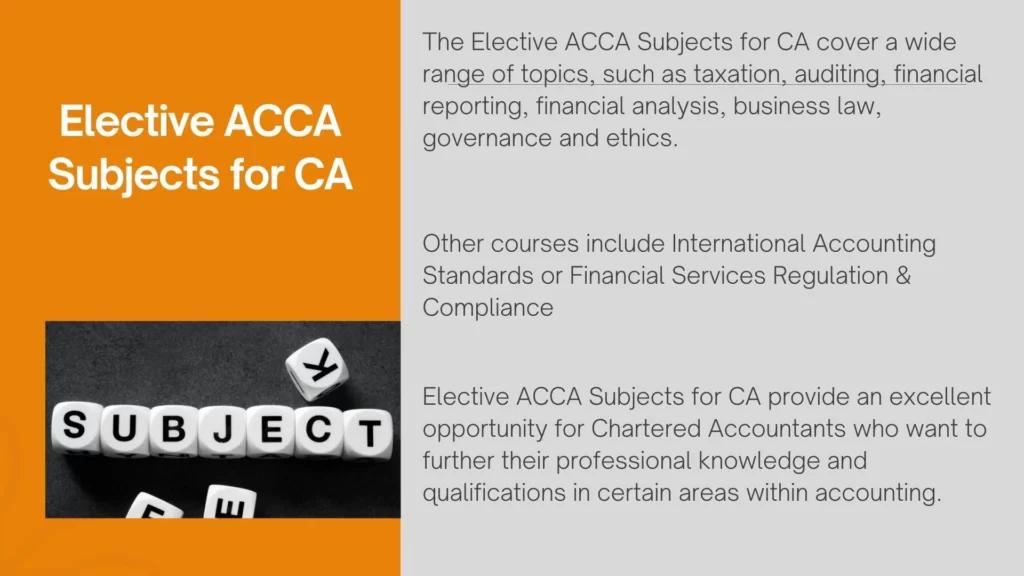Introduction
When studying for the ACCA Course, there is a range of important ACCA subject matters and topics that you need to develop a solid understanding of. From Professional Accountancy to Business Analysis, tackling each element is essential for success. Let’s take a look at the key ACCA subjects in more detail.
- Professional Accountancy is one of the major components of the ACCA subjects. With this subject, you will learn how to apply International Accounting Standards as well as Generally Accepted Accounting Principles so that you can compile accurate and reliable financial reports. At the end of these ACCA subjects, you should have a good understanding of how the laws and regulations underlying financial reporting work.
- Financial Reporting is another core ACCA subjects and it focuses on mastering all aspects of preparing and presenting financial statements. You will learn about all assets, liabilities, revenues and expenses, their classification into groups and analyze their impact on your client’s overall financial state. By the end of this subject matter, you will be able to produce accurate statements in accordance with IFRS standards.
- Corporate and Business Law is another fundamental ACCA subjects students. Here you will cover topics such as the company formation process, shareholders’ rights, directors’ duties and responsibilities (and much more). Through this module, you will be able to understand how different company structures are formed and maintained in line with national legislation.
- Audit & Assurance is an intensive topic within the course that requires strong technical accounting knowledge combined with professional judgment skills. As part of this module, you will gain insight into risk-based auditing processes so that stakeholders can be provided with reliable assurance services.
- Taxation: Taxation is one of the most important ACCA subjects, as it covers all aspects of taxation law and compliance. This subject will help you understand how different jurisdictions operate, the various tax laws applied to individuals, business entities, and other organizations, and how you can use those laws to your advantage when filing taxes or advising clients on tax planning matters.
- Performance Management: Performance management is an essential element of any accounting role in order to ensure accuracy and accuracy over time. In this subject, you will learn how to track key performance indicators in order to measure and compare outcomes against benchmarks that can be set within an organization or externally across industries.
- Financial Management: Financial management is a complex area that encompasses budgeting, forecasting, investment decisions and financial reporting among many other areas. This ACCA subjects will cover topics such as cash flow analysis and cost-benefit analysis so that you can develop an understanding of how businesses manage their finances from day-to-day operations through long-term financial goals.
- Business Analysis: Business analysis is another key area for aspiring accountants as it helps them understand the link between accounting practices used by organizations and their overall performance. With this knowledge, you can provide better advice on strategic decision-making processes, such as pricing strategies or marketing campaigns that impact top-line growth or productivity gains that may lead to bottom-line savings.
Details of the Subjects
If you’re considering taking a Professional Accountancy qualification, then ACCA Subjects are something that you should really consider. The Association of Chartered Certified Accountants (ACCA) is one of the leading providers in the world for such qualifications, with exams offered globally and covering a wide range of subjects.
The ACCA subjects are divided into four levels, which include Fundamental Level, Professional Level and a computer-based exam for Applied Knowledge. The Professional Level consists of 9 papers from P1 to P7 and the Fundamental Level consists of 5 papers from F4 to F9.
The overall cost of each paper can vary depending on which country you take your exams in – generally, they start at around £100 so it’s important to look into what option works best for your budget.
To qualify as an ACCA member, candidates must pass three EssentialACCA subjects as well as three Optional modules. This combination allows knowledge and skills development. The criteria for passing are also different for each exam paper so it’s important to make sure you understand what is required in order to pass each paper and become certified.
Once qualified, individuals will be certified with international standards which are highly sought after by employers across the world. Being an ACCA member definitely adds value to your portfolio and will give you the edge when competing for jobs in the finance sector or publicly listed companies around the world.
The ACCA has two levels: Strategic Professional (P1 P7) and Fundamental (F4 F9). The cost of each paper varies depending on where you take your exams. You can take computer-based exams worldwide all year round. Each paper has its own pass criteria set by ACCA which are different for every exam.
To gain the full qualification you must pass both levels – strategic professional and fundamental levels ACCA subjects. The strategic professional level focuses on managerial skills and consists of seven papers P1 (Governance, Risk & Ethics), P2 (Corporate Reporting), P3 (Business Analysis), P4 (Advanced Financial Management), P5 (Advanced Performance Management), P6 (Advanced Taxation) and P7 (Advanced Audit & Assurance).
The fundamental level ACCA subjects test your knowledge of technical skills and consist of nine papers F4 (Corporate & Business Law), F5 (Performance Management), F6 (Taxation), F7 (Financial Reporting), F8 and 9(Audit & Assurance).
Therefore, it’s important to prepare adequately for your exams in order to increase your chances of success. Achieving this qualification will certify that you hold international standards in accounting, whether you choose to pursue a career in finance or in another field altogether.
Have a look at the best Investment Banking program
ACCA Subjects and Levels

ACCA, or the Association of Chartered Certified Accountants, is a globally recognized professional accounting qualification. When obtaining ACCA membership, you’ll need to cover certain ACCA subjects divided between fourteen Knowledge Level and sixteen Skills Level papers.
The fourteen ACCA subjects based on knowledge levels cover areas such as Financial Reporting, Performance Management and Taxation. These assessments are designed to provide an understanding of fundamental accounting principles and their practical application in the industry.
In addition to the Knowledge Level qualifications there are sixteen Skills Level papers broken down into four different levels; they include Strategic Business Leader, Technical Financial Reporting, Strategic Business Reporting and Advanced Financial Management. These classes focus on more advanced topics such as corporate strategy and financial analysis, with a view to developing your professional problem-solving skills.
Finally, governance is also an essential part of ACCA qualifications. Completion of this module will ensure you have developed knowledge of global best practices in business management. This is crucial for compliance within companies and means that you can be sure your qualifications are recognized within the industry worldwide.
Clearly, then ACCA qualification involves more than just passing ACCA subjects exams – it’s about ensuring you have acquired the skills necessary for effective performance in a professional context. By delving into each of these areas through these levels you’ll be well equipped to practice in any accounting environment after passing all 14 Knowledge Level & 16 Skills Level papers.
Fundamental Level Courses Subjects

Fundamental Level Courses Subjects are the gateway topics to obtaining professional accreditation with the Association of Chartered Certified Accountants (ACCA). These well-regarded international qualifications open the door to a range of careers in accounting, finance and business fields around the world.
The Fundamental Level ACCA subjects form the entry point for anyone wanting to get an ACCA qualification. These papers will focus on developing the skillset needed for the financial world, such as how to interpret financial statements, how to create budgets, and understand cost concepts and management accounting principles.
- Paper F1 Business and Technology provides an introduction to broader business concepts such as Business Strategy, IT systems, Risk Analysis, Auditing and Operations Management. This paper helps equip learners with knowledge in key areas related to running a successful business while introducing them to more sophisticated systems they may encounter at advanced stages of their careers.
- Paper F2 Management Accounting is targeted at helping learners develop a sound understanding of management styles and practices. The paper focuses on accounting methods that can be used by managers, such as job costing, budgeting, decision making using variances and performance measurement analysis. As well as course content-related theory knowledge this paper also offers development in communication skills which are an essential role in any managerial job description.
- Paper F3 – Financial Accounting provides students with an understanding of double-entry bookkeeping techniques, as well as how to prepare financial statements, including those for companies. It also covers aspects such as basic costing principles, measurement of inventories, accounting information systems and other related topics.
- F4 (Corporate & Business Law) focuses on topics such as legal structures, laws relating to business entities, contracts for the sale of goods, setting up new businesses and dealing with shareholders. This paper enables students to develop legal knowledge that is essential in today’s commercial environment.
- F5 (Performance Management) aims to teach students how to measure business performance using techniques such as variance analysis and budgeting. Additionally, this paper covers topics such as decision-making tools and techniques for monitoring performance against objectives.
- F6 (Taxation) covers taxation systems within the UK, and EU law in relation to taxation matters, selfassessment calculations direct taxes collected by HMRC like corporation tax on profits or capital gains tax on investments.
- When it comes to F7, the focus is on financial reporting fundamentals. You will learn about preparing complete sets of financial statements, both by applying relevant accounting standards as well as by using practical examples. The syllabus also covers key topics such as liabilities in balance sheets, accounting for foreign currency transactions, and making interpretations from published accounts.
- Likewise, when studying F8 and 9 (Audit & Assurance), you will gain an understanding of how to audit entities within a range of contexts. This syllabus involves covering topics such as external audit work, risk management processes, understanding and evaluating internal control systems, and preparing assurance reports. You will also develop skills relating to independence and ethical behaviour in public interest entities.
Overall, if you are planning on taking your ACCA exams then it is important that you become familiar with the fundamentals behind these two core ACCA subjects Financial Reporting (F7) and Audit & Assurance (F8 & 9). With a thorough understanding of these two key topics, you can ensure that you have the knowledge needed to pass any ACCA examinations with flying colours!
Also, Give a visit to the best PG Program In Financial Modelling
Strategic Professionals Level Course Subjects

Are you considering taking the Strategic Professional Level course in ACCA? It comprises several specialized ACCA subjects, each of which requires dedicated time and effort to master. In the following blog, we will discuss the subject topics for P1 P7 to help you better understand the requirements of this level.
- P1 – Governance, Risk & Ethics: This paper covers topics related to corporate governance, including risk management and corporate ethics. It is designed to equip you with knowledge and skills to enable you to recognize and manage risks in business operations. Additionally, it also deals with applied professional ethics as required by ACCA standards.
- P2 – Corporate Reporting: This paper looks at financial reporting and how different types of reports can be structured according to specific needs and regulations. This includes understanding how to analyze financial statements, develop strategic plans and assess financial performance.
- P3 – Business Analysis: The focus here is on understanding the fundamentals of business analysis such as cost/benefit analysis, budgeting and strategy evaluation. You’ll learn how these theories may be applied in practice to identify both areas for improvement as well as opportunities for growth within a given firm or organization.
- Paper P4 – Advanced Financial Management (AFM): This paper covers topics related to complex financial decisions such as capital budgeting and working capital management strategies. Through this subject, you’ll gain an understanding of the varying tools used in decision-making and the importance of objective forecasting when creating financial models across a range of industries.
- Paper P5 – Advanced Performance Management (APM) is the perfect choice for strategic professionals who wish to further their expertise in corporate performance evaluation. This paper covers topics such as costing techniques, budgeting for decision-making, pricing strategies and value measurement tools. It also explores international performance management considerations, providing essential business intelligence.
- Paper P6 – Advanced Taxation (ATX) provides a thorough appreciation of UK taxation law and practice combined with the technical skills necessary for a professional accountant or tax adviser operating in modern commercial environments. This course includes core modules dealing with topics such as income tax; capital gains tax; corporation tax; trusts and estates; value-added tax; national insurance contributions; and double taxation relief.
- Finally, P7 (Advanced Audit & Assurance) provides guidance on the different types of assurance services offered by professional auditors today. You will gain an insight into the responsibilities of an auditor undertaking financial statement audit engagements, including developing audit plans and techniques for risk assessment as well as implementing suitable evidence-collection strategies.
As a strategic professional with ACCA qualifications, you can be sure that your skillset will stand out from the competition when looking for employment opportunities or starting up your own business. Make sure you invest in yourself to make the most of these leading-edge courses from ACCA!
Compulsory ACCA Subjects for CA

In this part, we will talk about Compulsory ACCA Subjects for CA. As you know that ACCA is a professional qualification and certification program that will help your career as a chartered accountant and increase your career prospects.
In order to gain accreditation, you must take and pass all of the compulsory ACCA subjects. These are known as the Fundamental ACCA subjects, which will provide you with a strong foundation of accounting knowledge and skills. The four required Fundamental Subjects include financial accounting, management accounting, business management and law.
Financial Accounting covers principles of double-entry bookkeeping, preparation of financial statements for single companies and groups of companies, the concept of capital and revenue expenditure, foreign exchange transactions and much more. Management Accounting explores how businesses manage their performance using cost measurement, budgeting techniques and other managerial tools to inform decision-making.
Business Management gives an introduction to business activities such as setting up a business, basic marketing principles and developing strategies to manage organizational change. Lastly, Law looks at contractual relationships between individuals or businesses in addition to understanding legal issues arising from employment relationships or commercial contracts.
These four compulsory ACCA subjects will form the basis for your CA studies and are essential if you wish to become an accredited chartered accountant. It is important to note that some universities may offer variations on these four fundamental subjects or may have additional requirements beyond this core group–so it’s vital that you check with your institution beforehand if unsure.
Know how to become investment banker in india
Elective ACCA Subjects for CA

Elective ACCA Subjects are designed to provide breadth and depth of understanding in speciality areas within accounting. These courses allow you to specialize in a certain area of accounting and build up professional qualifications which can help open up more opportunities for career development.
The Elective ACCA Subjects for CA cover a wide range of topics, such as taxation, auditing, financial reporting, financial analysis, business law, governance and ethics. Each subject provides a unique set of learning objectives that can help to broaden your accounting knowledge and skills.
For example, the Taxation subject explores various taxation systems and their practical application as well as provides an analysis of key issues associated with taxation planning. This knowledge can be used to develop an effective tax strategy for businesses or individuals. Auditing is another popular elective subject that covers important topics such as internal control systems, management report preparation and the interpretation of audit reports.
In addition to these core ACCA subjects, there are also electives available that focus on specific areas of accounting. For example, you may choose to specialize in Mergers & Acquisitions or Financial Risk Management & Derivatives.
Other courses include International Accounting Standards or Financial Services Regulation & Compliance. Each course provides detailed examinations into various aspects of the chosen topic which can prove invaluable when developing your career in accounting.
Overall, Elective ACCA Subjects for CA provide an excellent opportunity for Chartered Accountants who want to further their professional knowledge and qualifications in certain areas within accounting.
Conclusion
ACCA subjects are invaluable to those looking to conquer the world of accounting and finance. With a rigorous curriculum, they offer a broad array of topics and specialize in key knowledge and skills that enhance professional capabilities. Obtaining these high-quality international qualifications not only strengthens a person’s portfolio but proves highly marketable credentials for employers.
ACCA subjects not only improve job prospects globally but provide skills that are essential for succeeding in the corporate world. With their ability to build adaptability and develop specialized technical principles, ACCA can equip an individual with strong qualifications that can take them to the next level.
In addition, undergoing ACCA training allows you to join an extensive and growing network of industry professionals from all over the world – making it an ideal way to expand your horizons without even leaving your seat.
The opportunities a qualification in ACCA can bring are immense; by taking the initiative now, you can open up doors that had previously been closed. From obtaining chartered status, gaining insight into new markets or simply having access to improved job options, success comes with choosing ACCA as your course of study. So take the plunge today and set yourself up for success with ACCA subjects!
The ACCA subjects include courses in Business & Technology, Management Accounting, Financial Accounting, Corporate and Business Law, Taxation, Performance Management, Financial Reporting, Audit and Assurance, Financial Management, Strategic Business Leader, Strategic Business Reporting, Advanced Financial Management and Advanced.
The ACCA syllabus includes 14 exams. The Fundamental level has 9 exams (F1 to F9). To receive your certification, you must complete 5 Professional level exams: P1, P2, and P3 are compulsory, then choose any two from the optional papers P4, P5, P6 and P7.
ACCA is a globally recognized qualification, which is seen as being superior to CA. CA (Chartered Accountant) focuses on India’s accounting, finance, and taxation systems, making it perfect for those who want to work in India but not ideal for those looking to work overseas.
The good news is that the ACCA exam is not very hard. It’s actually easier to pass than other professional finance and accountancy courses like the CA and CFA. It’s still more challenging than school and undergraduate tests, though.
You can complete the Association of Chartered Certified Accountants (ACCA) course in as little as 6 months, although it usually takes two years. The length of time to complete the course depends on which degree pathway you choose.
No, if you studied accountancy in 12th grade you don’t need maths to pursue ACCA. You must have a minimum of 65% in Accounts or Mathematics and English, as well as 50% in all other subjects, and you must be at least 18 years old to qualify.
You can finish the ACCA course and exams in two years, but you need at least three years of experience to get the ACCA certification. This is because the ACCA requires three years of practical experience before they will consider you a qualified accountant and let you become an ACCA member.
To be eligible for ACCA, you must be at least 16 years old and have completed 12th grade with at least 60% in English, Maths and Accountancy. Alternatively, you can start the ACCA qualification after completing the Foundation in Accountancy (FIA).
To be eligible for the ACCA course, students must have completed 10+2 and earned at least 65% in accounting/math and English. They must also have scored 50% or more in all other subjects.
The Association of Chartered Certified Accountants is an international organization that provides professional education for those who want to pursue a career in accounting, finance, or management. The cost of registering with the ACCA is around 1,20,000.





